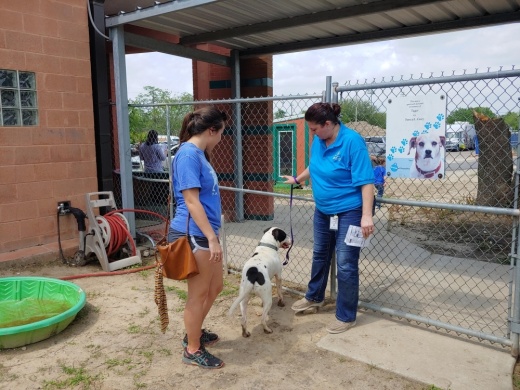As Greater Houston-area animal shelters and rescue organizations deal with an increased volume of animals amidst the developing coronavirus pandemic, these organizations are also expanding the ways in which residents can provide support from home.
The novel coronavirus pandemic comes at a time when the Harris County Animal Shelter and others are usually seeing a higher volume of animals as a result of the spring and summer months, said Eddie Miranda, senior public information officer of Harris County Public Health.
“Typically, this is the time of year where it's really a breeding time for a lot of our animals,” he said. “Earlier this month, we did receive a high intake of dogs, who actually were pregnant, and ... we had a lot of puppies brought in, so that's where we have spiked up in those [intake] numbers ... with cats as well.”
According to Miranda, recent state- and county-level orders urging residents to stay at home in an effort to inhibit the spread of the virus could result in economic restraints, leaving residents unable to care for their animals. Miranda said this could increase the number of pet surrenders to shelters and further add to the already-increased animal intake rates.
“With the current economic situation, and as a result of coronavirus ... many people can't afford to care for their pets anymore because they're either out of a job or just can’t afford to take care [of them]."
To curb this increase, Miranda said the Harris County Animal Shelter implemented new intake policies early last week, such as limiting the number of days the shelter will accept surrendered animals. Unincorporated Harris County residents can now surrender animals to the shelter on all days except Wednesdays, Fridays and Sundays.
Miranda said the shelter has also been promoting its foster program, given that most residents are spending more time than usual at home as a result of the pandemic.
“Some people ... may have a little bit more time at home," he said. "There may be some families [with children] out there that would be willing to care for a pet or an animal during this time.”
Miranda said the Harris County Animal Shelter is continuing its normal field operations, such as stray retrieval, with added precautions such as curbside adoption and individual foster pickups. Miranda said the shelter has released more than 300 animals over the past week by means of transport to other facilities, adoptions or foster ownership.
Residents interested in fostering pets during this time can find more information on available animals and proper social distancing policies for pet pickups online.
Starting March 24, the Montgomery County Animal Shelter closed its doors to the public and transitioned into an appointment-based system in compliance with coronavirus-related social distancing measures, as previously reported by Community Impact Newspaper. With 274 animals onsite as of March 23, the shelter stopped the intake of animals and called for the public’s assistance in helping to relieve some of the animals through adoption, fostering or rescue, according to a press release.
“Our goal is to greatly reduce the current animal inventory at MCAS by getting animals into foster homes, adopter homes or rescues during this closure,” director Aaron Johnson said in the press release. “We can accommodate adoption, foster or rescue within shelter, curbside, and delivery or try to accommodate whatever needs or request you may have to make it happen.”
When conducting transport cases, The Woodlands-based nonprofit Operation Pets Alive! has been turned down by shelters that are also too full to accept intakes, meaning current foster owners could be keeping their pets longer than they expected, organization president Marcia Piotter said.
“It's not a huge impact on [Operation Pets Alive!], ... but some people do [foster pets] with the view that they're only going to have them for two weeks or three weeks, and then they maybe have another obligation,” Plotter said. “It's a very changing environment and, in general, we've just tried to stay put and not do a lot of extraneous things that we would have normally done.”
Piotter said the coronavirus pandemic has slowed day-to-day operations, such as veterinarians asking the organization to put a temporary hold on nonemergency surgeries like spays and neutering. Following social distancing procedures, partnering veterinary clinics are limiting the number of employees at facilities and limiting procedures to essentials such as some vaccinations or emergency surgeries in respect of a shortage of medical supplies due to the pandemic, Piotter said.
“We are trying to support our veterinary community by limiting the interaction with their staff, but also giving them enough work to keep their staff employed,” Piotter said.
To support veterinarians, Piotter plans for Operation Pets Alive! to launch an online effort later this week to make fabric surgical masks for local veterinary clinics that are also experiencing a shortage in supplies. More information on the developing project can be found on the Operation Pets Alive! Facebook.
“We have an Etsy store and we have ... a lot of people that can't take animals into their home, but they can sew, and they're crafty,” Plotter said. “Our motto is helping people save pets, but we also help people. We're emphasizing that a little bit more right now.”





